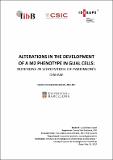Por favor, use este identificador para citar o enlazar a este item:
http://hdl.handle.net/10261/177859COMPARTIR / EXPORTAR:
 SHARE
BASE SHARE
BASE
|
|
| Visualizar otros formatos: MARC | Dublin Core | RDF | ORE | MODS | METS | DIDL | DATACITE | |

| Título: | Alterations in the development of a M2 phenotype in glial cells: rotenone in vitro model of Parkinson's disease |
Autor: | Blasco-Agell, Lucas CSIC ORCID | Director: | Solà, Carme CSIC ORCID | Fecha de publicación: | 12-jun-2017 | Editor: | Universidad de Barcelona CSIC - Instituto de Investigaciones Biomédicas de Barcelona (IIBB) |
Resumen: | Parkinson’s disease is a chronic, progressive, disabling neurodegenerative disease of unknown cause. It turned out to be the second most common neurodegenerative disorder after Alzheimer Disease, and is characterized by motor and non-motor symptoms. As a multifactorial disease, it is characterized by dopaminergic degeneration, depositions of α-synuclein aggregates, and to run with an inflammatory process. The involvement of microglial cells on this chronic inflammation within the parenchyma is long accepted but its role is not fully understood. Both genetic and environmental factors have been postulated to play a role in the development of Parkinson’s disease. Epidemiological studies show that the exposition to certain toxins, among them rotenone, is a risk factor to develop this neurodegenerative disease. Although the neurotoxic effect of rotenone has been widely studied in experimental approaches, the effect of rotenone on glial cells remains poorly characterized. The present work was aimed to study whether rotenone induced the expression of M2 markers in glial cells, and also whether rotenone interfered with the development of a M2 phenotype induced by Interleukin-4 in glial cells, using primary glial cultures. The results obtained reveal that rotenone did not induce the expression of M2 markers in glial cells per se. However, it dramatically inhibited the development of a M2 phenotype induced by Interleukin-4 in mixed glial cell cultures. On the contrary, rotenone did not modify Interleukin-4 – induced M2 phenotype in microglial cell cultures, suggesting the existence of alternative mechanisms to obtain energy of microglial cell cultures. However, phagocytic activity was impaired in microglial cell cultures. The results obtained suggest that rotenone impairs the immune response of glial cells and that glial cell dysfunction due to a direct action of certain toxins on glial cells may contribute to the development of neurodegeneration in PD. | URI: | http://hdl.handle.net/10261/177859 |
| Aparece en las colecciones: | (IIBB) Tesis |
Ficheros en este ítem:
| Fichero | Descripción | Tamaño | Formato | |
|---|---|---|---|---|
| ALTERATIONS_BlascoAgell.pdf | 2,56 MB | Adobe PDF |  Visualizar/Abrir |
CORE Recommender
Page view(s)
257
checked on 23-abr-2024
Download(s)
191
checked on 23-abr-2024
Google ScholarTM
Check
NOTA: Los ítems de Digital.CSIC están protegidos por copyright, con todos los derechos reservados, a menos que se indique lo contrario.
